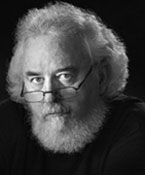Maybe Science Fiction Is Dying, But If So, The ER Is As Crowded and Raucous As That Cantina In Star Wars
I’ve had a lifelong patchiness in my relationship to science fiction. In the up part of the cycle, I devour it and read—or watch—little else. Once I discovered Frank Herbert’s Dune saga novels, with their giant, spice-protecting sandworms in the deserts of Arrakis and all else, I had to read them all, and did so with dispatch. Ditto with most of Robert Heinlein’s books and to a lesser extent, Arthur C. Clarke’s and Isaac Asimov’s (at least, his sci-fi stuff). And then in the down part of the cycle, I’m deaf and blind to the genre.
This bipolar irregularity no doubt caused me to miss a once-in-a-lifetime opportunity as a sci-fic fan and may have caused me to miss a unique opportunity as a writer. Because one of the greats of American science fiction writing joined the English faculty of my alma mater, Eastern New Mexico University, while I was enrolled there. It was a small school, but even so, I still blew right past the fact that I could have studied science fiction writing as taught by one of the winners of the Science Fiction Writers of America’s Grand Master of Science Fiction Writing award. The first honoree was Heinlein. The second was Jack Williamson of Elida, New Mexico.
Lately, I’ve been away. Again. Though I am aware of the availability of new sci-fi TV series like Fringe, Heroes and FlashForward, nothing has really captivated me sci-fi-wise on the TV screen or book page since The X-Files.
And probably this sleeping dog would still be slumbering had not an odd-sounding post showed up the other day in a Yahoo Group I belong to. The writer is a highly placed government bureaucrat. A really powerful one in scientific research circles, if for no other reason because he presides over who gets multi-million-dollar government research grants. So he’s an accomplished veteran at eviscerating claims by others with whom he disagrees, and he does so regularly in this online community. But here he was, speaking with an unaccustomed tentativeness approaching raw awe.
His story had to do with his viewing the second of Arnold Schwarzenegger’s Terminator movies, the ones in which post-apocalyptic artificially intelligent machines seek to exterminate what is left of a human race. What totally “creeped” him out about this movie, said this Washington bureaucrat, was that it contained several scenes that tracked real events and people in his life and career so faithfully and accurately that it felt like he was being spied on. Fresh on his mind, too, was one of the findings of his agency about good predictors of which emerging technologies would pan out (and should be funded) and which wouldn’t (and shouldn’t be). One finding was that new technologies treated as being favorable to humans in science fiction plots “somehow mysteriously prospered more than you would have expected.” (I’m not posting a link to his comments, since the group is private.)
I don’t know whether he was being spied on or not (he thinks not, after thinking about it.) But what about the U.S. government’s finding that if science fiction thinks well of something being possible in the real world, it has a better than otherwise chance of really happening? Does, in fact, science fiction have a good track record of predicting anything? And does, in fact, anyone take science fiction very seriously anymore? I went looking for answers or, at minimum, opinions. Here’s a CliffsNotes’ version of what I found:
Science fiction requires an optimistic audience, so in a world of growing pessimism, as a viable literary category, science fiction may be dying.
This is the view of George R. R. Martin, who writes both sci-fi and fantasy novels. Sci-fi was in its heydays in the 1950s and 1960s, he observes. The future was an appealing place—one some people couldn’t wait to get to. They thought that their children and grandchildren would be better off and happier there. Now he says, people worry about ecological problems, global warming, the growing instability of the world with nuclear proliferation. He says, “People no longer believe on some level that the future is going to be a good place and they prefer to read about other times and other places that are maybe not so scary as science fiction.”
The real and the fictional worlds have become so interwoven that good sci-fi writing gets lost in the hoopla, the buncombe and macabre of the potentially real. The new ABC series, FlashForward, is based on Canadian sci-fi author Robert J. Sawyer’s acclaimed book of that title. In it, two scientists at the European CERN particule accelerator accidentally transport the world’s consciousness 21 years into the future, then return it a couple of minutes later. Naturally, the sudden memories of what is to be terrorize humanity. The best-seller thriller Angels and Demons has Vatican City under threat from a bomb made of anti-matter stolen from CERN. Another best-seller, Blasphemy, has a mad physicist trying to use a CERN-like particle accelerator to talk with God. Then along comes two halfway reputable physicists with a real theory about an experiment CERN hopes to do with its problem-beset new accelerator. They believe that the illusive sub-atomic particle, the Higgs boson, may be so “abhorrent to nature” that it could cause the natural world to try to reverse-engineer reality and wipe out the experimental apparatus trying to create it. They suggest that this might explain the serious mishaps that have struck the Swiss project. So … which is “the science fiction”?
Even science fiction writers have been disappointed that more of their predictions and expectations have not panned out. One candid enough to say so is the oft-honored Frederik Pohl, who has written sci-fi for more than 70 years (he celebrates birthday No. 90 on November 26). Very little of what science fiction has described, he says, has come to pass. “You can’t jump into your spaceship and fly off to Mars and have adventures with six-limbed green Martians, riding floats. It isn’t going to happen. There aren’t any,” he says. “I’m really kind of disappointed. I wish that we had had the right kind of spacecraft. And it doesn’t look like now they’re ever going to happen, or at least not in the immediate future, by which I mean, the time before the sun goes out.”
No matter how hard they try, writers of science fiction can’t escape the influence of the bigger social trends (biases, political correctnesses) of their times. And this isn’t necessarily good for their work. Sci-fi/fantasy writer Jo Walton makes this case in talking about Heinlein’s juvenile work, Time for the Stars, published in 1956. She suggests if Heinlein had written the work recently, “it would have been a different book in almost every way.” For example, earthlings wouldn’t be going out to exploit the galaxy. Earth would be dying because of global warming and pollution, not simple over-population. The book would focus on relationships, not adventure. Characters would have more sex, treated very differently. The odd incestuous relationship between Tom and his great-great-niece Vicky would be more explicitly sexualized at long distance and contain more angst. Says Walton, “I’d read it, but I probably wouldn’t keep coming back to it.” In other words, its topicality would have diminished its appeal, something some critics suggest is happening a lot to science fiction these days.
Prophesy and prophets that take themselves seriously—Nostrademas included—are usually delusional, but some science fiction reader/critics are concerned that sci-fi writers not back away from the prophetical challenge. James Wallace Harris worries, “Personally, I think science fiction is at a turning point—at a cusp—like when a religion turns from revelation to dogma.” He is captivated by Nassim Nicholas Taleb’s arguments in The Black Swan against trying to predict the future. (The black swan is Taleb’s brilliant metaphor for a future that seems to be predictable only in hindsight.) But Harris is also concerned that science fiction writers not discount their value as writers of philosophical fiction. That is, fiction that helps us imagine purposeful “black swans” useful in explaining why our species may be the first to come fully awake (in Harris’s words) “in the infinite foam of multiverse reality.”
And all this doesn’t really begin to do justice to the cacophonous debate under way about the health, the role, the purity (or the contamination), the state and the fate or the coolness or uncoolness of science fiction today. Is it true that science fiction has become too feminine in no small part because its ranks have been invaded by feminists? Is it true that science fiction perennially “eats its best”—that is, automatically redefines its most talented writers as being writers of some other type of literature the moment they become recognized or canonized? Is it true that some of the best sci-fi writers—Kurt Vonnegut, J. G. Ballard, Margaret Atwood—are, or were, right to resist the idea that they write science fiction at all?
Obviously a lot has been going on since I last paid much attention. I think I’ll go rent a copy of Blade Runner and get back in the hunt.



Hi! Thanks for linking to my website. I would like to clarify a couple of things:
One, my blog post (I believe) firmly refutes the notion that the genre has become “too feminine”. Two, a better link to what I have to say about the topic is http://serialdistractions.wordpress.com/2009/10/13/im-a-conscientious-objector-in-the-war-on-science-fiction/
I enjoyed your post quite a bit…especially all the link/references to other articles. I think that many of the trends we see happening in sci-fi are also affecting other genre’s as well…really, literature and story-telling in general. I find it fascinating. Thanks!